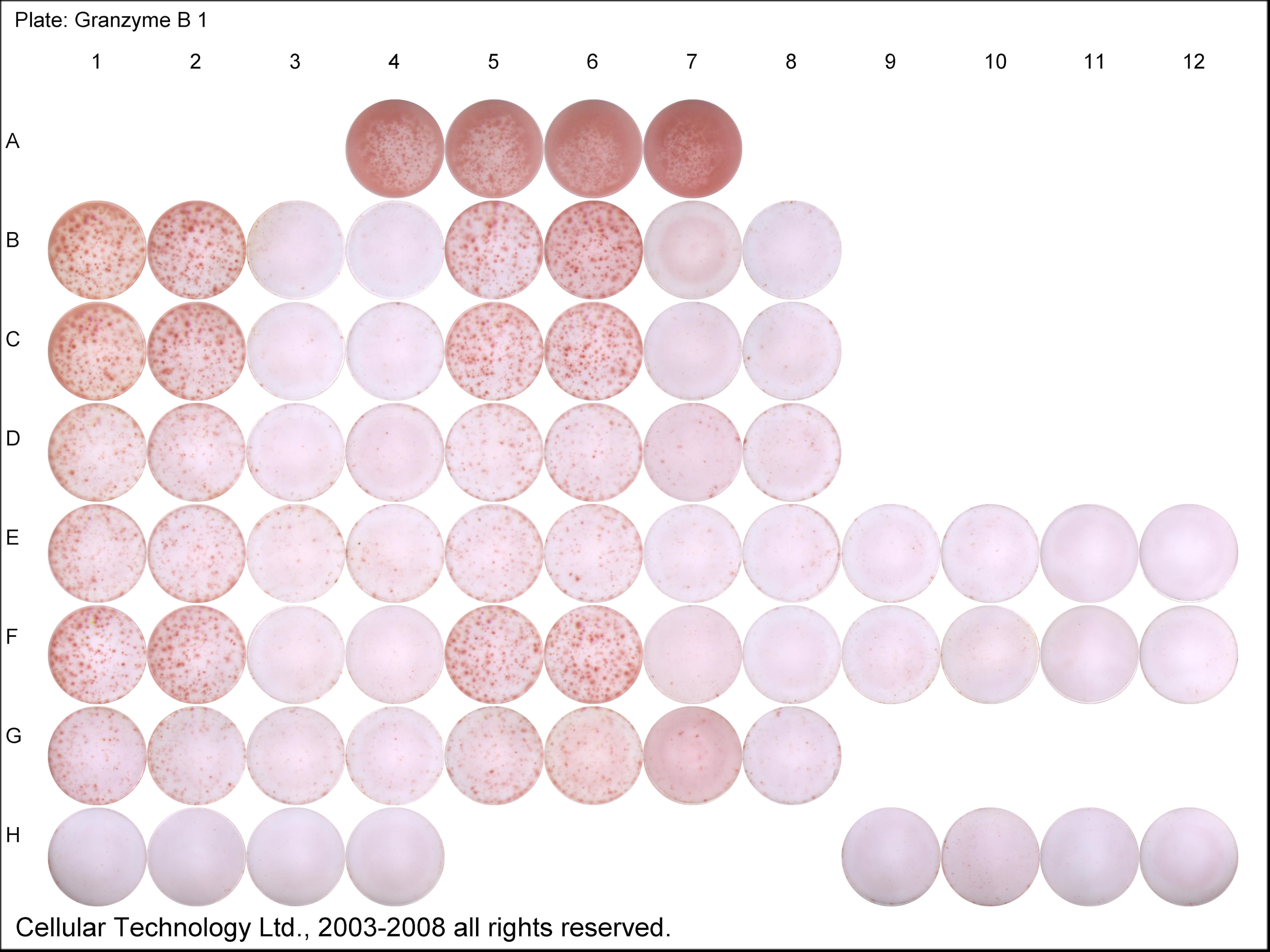Human Granzyme B ELISpot Development Module, 5 Plate Summary
* Provided that the recommended microplates, buffers, diluents, substrates and solutions are used, and the assay is run as summarized in the Assay Procedure provided.
Complete ELISpot kits are highly sensitive, microplate-based assays for the detection of cytokine secreting cells. Kits are available for detection and enumeration of a single analyte or two analytes simultaneously. Complete ELISpot kits are ready-to-run and require no assay development or refinement. ELISpot Development Modules contain the basic components required to develop an ELISpot assay. They offer an economical alternative to buying separate antibodies.
ELISpot development modules are an alternative to ELISpot kits. A basic understanding of ELISpot assay development is required for the successful use of these reagents. Each investigator should optimize the coating conditions, the assay sensitivity, the type of enzyme and substrate, as well as the concentrations of the capture and detection antibodies to achieve desired results. The analyte-specific ELISpot Development Module and the ELISpot Blue Color Module contain the necessary components for analyte detection and visualization, respectively. These modules can be used together but are sold separately. Each module contains enough reagents for at least five 96-well microplates.
- An economical alternative to ELISpot Kits
- Optimized capture and detection antibody pairings and recommended concentrations save lengthy development time
- Generic development protocols provide direction to start an optimization protocol
- Customize the assay to your specific needs
- Human Granzyme B Capture Antibody
- Human Granzyme B Biotinylated-conjugated Detection Antibody
- ELISpot Blue Color Module or equivalent (R&D Systems, Catalog # SEL002)
- PBS - 137 mM NaCl, 2.7 mM KCl, 8.1 mM Na2HPO4, 1.5 mM KH2PO4, pH 7.2 - 7.4, 0.2 µm filtered
- Wash Buffer - 0.05% Tween® 20 in PBS
- Blocking Buffer - 1% BSA, 5% Sucrose in PBS
- Reagent Diluent - 1% BSA in PBS, pH 7.2 - 7.4, 0.2 µm filtered
- 2 °C – 8 °C refrigerator
- 37 °C CO2 incubator
- Positive Control - Use Recombinant Human Granzyme B or cells known to secrete Human Granzyme B
- 96-well plates - Nitrocellulose-bottom plates, PVDF-bottom Immunospot® plates, or flat-bottom polystyrene Immulon® ELISA plates
- Multi-channel pipette, squirt bottle, manifold dispenser, or automated microplate washer
- Dissection microscope or an automated ELISpot Reader
- Deionized H2O
Trademarks and registered trademarks are the property of their respective companies.
Product Datasheets
Preparation and Storage
Background: Granzyme B
Granzyme family serine proteases are stored in the granules of cytotoxic T lymphocytes and natural killer cells. Granzymes contain one S1 protease domain and are synthesized as preproproteins. Granzymes are released toward pathogen infected or transformed target cells during cellular immune reactions. Target cell entry by granzymes is through perforin channels. Granzymes trigger apoptosis by caspase-dependent and -independent mechanisms. There are five granzymes (A, B, G, H and K) in human and many more in mouse and rat.
FAQs
No product specific FAQs exist for this product, however you may
View all ELISpot and FluoroSpot Kit FAQsReviews for Human Granzyme B ELISpot Development Module, 5 Plate
Average Rating: 5 (Based on 1 Review)
Have you used Human Granzyme B ELISpot Development Module, 5 Plate?
Submit a review and receive an Amazon gift card.
$25/€18/£15/$25CAN/¥75 Yuan/¥2500 Yen for a review with an image
$10/€7/£6/$10 CAD/¥70 Yuan/¥1110 Yen for a review without an image
Filter by:
Human Antigen specific T cells were co-cultured at different ratios with target cells expressing target antigen or an irrelevant peptide at different ratios from 1:1 (50,000:50,000 cells), to 1:2 and 1:0.5. Top rows are the positive control in which T cells were activated with PMA/Ionomycin. This data was published in December 2017 on the journal Gender and The Genome.





